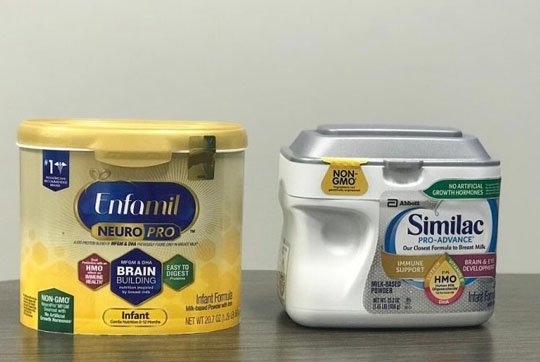Enfamil vs Similac would be your most sought-after query when it comes to feeding your baby with formula. From one’s specialized option for spit-up to the other’s standard formulas, which will serve your baby best?
We have come up with the main points of difference in the debate of Enfamil vs Similac that will save you the worry of trying and discarding. Read on to know!
Table of Contents
The Main Differences: Enfamil vs Similac
While both Similac and Enfamil share several similarities, they have some differences. Here are three ways in which they differ:
-
Standard Milk-based Formula From Both Brands: NeuroPro Enfamil vs Similac Advance
| Point of difference | NeuroPro Enfamil | Similac Advance |
| Price | $162 | $129 |
| Types of milk contents present | It contains milk fat globule membrane that can mimic breastmilk and
|
It contains
|
| Types of acids present | It has slightly higher levels of eye-boosting fatty acids:
|
Similac boasts:
|
| The Winner: Enfamil NeuroPro is the clear winner in the point of comparison between standard milk-based formulas because of the presence of MFGM (milk fat globule membrane). This substance makes the formula resemble breastmilk and it boosts motor, cognitive, and language development in babies. | ||
-
Gentle Baby Formula From Both Brands: Gentlease Enfamil vs Similac Pro Total Comfort
Doctors will ask you to shift to gentle baby formulas (partially hydrolyzed formulas) if standard baby formulas cause these symptoms in your child:
- Sensitivity to lactose
- Excessive fussiness or colic
- Digestive issues
- Gas
| Point of difference | Gentlease Enfamil | Similac Pro Total Comfort |
| Price | $133.95 | $135.96 |
| Types of protein present | It has 40% casein and 60% whey proteins (both partially hydrolyzed). | It contains 100% partially hydrolyzed whey protein. |
| Human Milk Oligosaccharides (HMOs) | Enfamil Gentlease does not contain HMO. | It also contains naturally occurring prebiotics, and HMO (human milk oligosaccharides) that provide the baby with
|
| Ingredients | The main ingredients of Enfamil Gentlease are
|
The main ingredients of gentle baby formula from Similac are
|
| The Winner: Clearly, Similac Pro Total Comfort is the winner in this comparison between gentle baby formulas from both the brands as it contains HMOs. Both the brands have protein sources but whey is way easier to digest for babies with lactose intolerance. | ||
-
Best Baby Formula For Spit-up From Both Brands: Enfamil AR vs Similac Spit-up
Spit-up baby formulas are recommended for babies who are not gaining weight or showing insignificant growth due to their spitting habit.
| Point of difference | Enfamil AR | Similac Spit-up |
| Price | $28.82 | $28.99 |
| Percentage of spit-up reduction | Enfamil claims to reduce spit-ups by 50%. | Similac reduces spit-ups by 54%. |
| Rice starch | Enfamil AR contains rice starch and a blend of ARA and DHA. | This formula has rice starch that eases spit up, in addition, to a blend of
|
| Ingredients | The formula’s main ingredients are
|
Its main ingredients are
|
| The Winner: Similac spit-up is the winner here because of its lower price and efficiency even though the brands contain rice starch. | ||
The Bottom Line: Other Infant Formulas From Enfamil vs Similac
Both Similac and Enfamil offer other formulas meant for babies who are intolerant to cow’s milk protein.
| Sl. No. | Enfamil | Similac |
|
|
Nutramigen with Enflora LGG Powder:
|
Similac Alimentum:
|
|
|
PurAmino Hypoallergenic Infant Formula Powder:
|
FAQs
- Can you switch between Enfamil and Similac?
Consult your pediatrician if you are thinking of switching baby formulas. You will find products from Enfamil that can purposefully replace products from Similac. You can change brands safely if your baby does not need specialized formula. Get in touch with your pediatrician though so that you can rule out any unwanted allergies.
- Why does baby formula contain corn syrup?
Enfamil mentions that corn syrup, derived from corn, contains long glucose chains. Corn syrup provides a high energy quotient for babies but is not similar to high-fructose corn syrup.
- Can you microwave the baby formula?
The FDA is against heating breast milk or infant formula in the microwave. These liquids do not heat up evenly which will create hotspots in them. Your baby might burn their throat or mouth if they consume such pints of milk.
- What if your baby doesn’t like baby formula?
If your baby doesn’t like baby formula, they will throw up the milk (which is more than the normal spit-up). They may also experience stomach aches if they are allergic or sensitive to the protein present in cow’s milk. Speak with your pediatrician for alternatives and to find the root cause of your baby’s discomfort.





